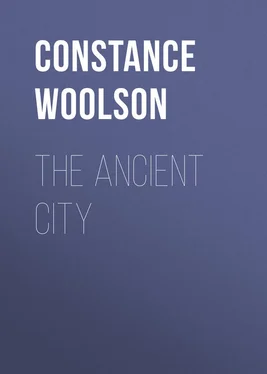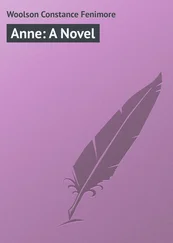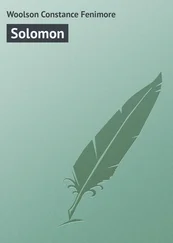Constance Woolson - The Ancient City
Здесь есть возможность читать онлайн «Constance Woolson - The Ancient City» — ознакомительный отрывок электронной книги совершенно бесплатно, а после прочтения отрывка купить полную версию. В некоторых случаях можно слушать аудио, скачать через торрент в формате fb2 и присутствует краткое содержание. Жанр: foreign_prose, на английском языке. Описание произведения, (предисловие) а так же отзывы посетителей доступны на портале библиотеки ЛибКат.
- Название:The Ancient City
- Автор:
- Жанр:
- Год:неизвестен
- ISBN:нет данных
- Рейтинг книги:4 / 5. Голосов: 1
-
Избранное:Добавить в избранное
- Отзывы:
-
Ваша оценка:
- 80
- 1
- 2
- 3
- 4
- 5
The Ancient City: краткое содержание, описание и аннотация
Предлагаем к чтению аннотацию, описание, краткое содержание или предисловие (зависит от того, что написал сам автор книги «The Ancient City»). Если вы не нашли необходимую информацию о книге — напишите в комментариях, мы постараемся отыскать её.
The Ancient City — читать онлайн ознакомительный отрывок
Ниже представлен текст книги, разбитый по страницам. Система сохранения места последней прочитанной страницы, позволяет с удобством читать онлайн бесплатно книгу «The Ancient City», без необходимости каждый раз заново искать на чём Вы остановились. Поставьте закладку, и сможете в любой момент перейти на страницу, на которой закончили чтение.
Интервал:
Закладка:
“Do you hear the sound of the breakers, Martha?” said Sara, waking me up in the middle of the night. We had the balconied room up stairs, and the sound of the distant surf came in through the open window in the intense stillness of the night. “It makes me feel young again,” murmured my companion; but I fell asleep and heard no more.
Before breakfast, which is always late in Florida, John Hoffman took us to see a wonderful rose-tree.
“You must have sprays of bloom by the side of your coffee-cups,” he said, “and then you will realize that you are really ‘away down upon the Swannee Ribber.’ ”
“Do you mean to tell me that the Suwannee is in ambush somewhere about here?” began Sara, in her lead-pencil voice. She always declared that her voice took a scratching tone when she asked a manuscript question.
“Not directly here, seeing that it flows into the Gulf of Mexico, but it is in Florida, and therefore will do for melodious comparisons. You will hear that song often enough, Miss St. John; it is the invariable resource of all the Northern sailing parties on the inlet by moonlight. What the Suwannee means by keeping itself hidden away over in the western part of the State I can not imagine. I am sure we Northerners for years have mentioned that ‘dar’s whar our hearts am turning ebber,’ in every key known to music.”
“The tune has a sweet melody of its own,” I said. “Nilsson herself sang it as an encore last winter.”
We walked out St. George Street, the principal avenue of the Ancient City, with the proud width of fifteen feet; other streets turning off to the right and the left were not more than ten and twelve feet wide. The old Spaniards built their coquina houses close together, directly upon the narrow streets, so that from their overhanging balconies on opposite sides they could shake hands with each other if so disposed. I do not think they were so disposed; probably they were more disposed to stab each other, if all accounts are true; but the balconies were near enough for either purpose. They had gardens, too, those old Dons, gardens full of fig, orange, guava, and pomegranate trees, adorned with fountains and flowers; but the garden was behind the house, and any portion of it on the street was jealously guarded by a stone wall almost as high as the house. These walls remain even now the most marked feature of the St. Augustine streets.
“What singular ideas!” I said. “One would suppose that broad shaded streets and houses set far back among trees would be the natural resource of this tropical climate.”
“On the contrary, Miss Martha, the Spaniards thought that their narrow walled-in streets would act like so many flues to suck in every current of air, while their overhanging balconies would cast a more reliable shade than any tree.”
“There is something in that,” said Sara. “What a beautiful garden!”
“Yes; that is the most picturesque garden in St. Augustine, in my opinion,” said John. “Notice those two trees; they are date-palms. Later in the spring the star-jasmine covers the back of the house with such a profusion of flowers that it becomes necessary to close the windows to keep out the overpowering sweetness. That little street at the corner is Treasury Street, and part of the walls and arches of this house belonged to the old Spanish Treasury Buildings.”
A few blocks beyond, and the houses grew smaller; little streets with odd names branched off – St. Hypolita, Cuna, Spanish, and Tolomato – all closely built up, and inhabited by a dark-eyed, olive-skinned people, who regarded us with calm superiority as we passed.
“All this quarter is Minorca Town,” said John, “and these people are the descendants of the colonists brought from the Greek islands, from Corsica, and Minorca, in 1767, by a speculative Englishman, Dr. Turnbull. Originally there were fourteen hundred of them, and Turnbull settled them on a tract of land sixty miles south of here, near Mosquito Inlet, where, bound by indentures, they remained nine years cultivating indigo and sugar, and then rising against the tyranny of their governor, they mutinied and came here in a body. Land was assigned to them, and they built up all this north quarter, where their descendants now live, as you see, in tranquil content, with no more idea of work, as a Northerner understands the word, than so many oysters in their own bay.”
“The Greek islands, did you say?” asked Sara. “Is it possible that I see before me any of the relatives of Sappho, she of ‘the Isles of Greece – the Isles of Greece?’ ”
“Maybe,” said John. “You will see some dark almond-shaped eyes, now and then a classical nose, often a mass of Oriental black hair; but unfortunately, so far, I have never seen the attractions united in the same person. Sometimes, however, on Sunday afternoons, you will meet young girls walking together on the Shell Road, with roses in their glossy hair, and as their dark eyes meet yours, you are reminded of Italy.”
“I have never been in Italy,” said Sara, shortly.
The reflection of an inward smile crossed John Hoffman’s face.
“But where is the rose-tree?” I said.
“Here, madam. Do you see that little shop with the open window? Notice the old man sitting within at the forge. He is a fine old Spanish gentleman and lock-smith, and my very good friend. Señor Oliveros, may we see the rose-tree?”
The old man looked up from some delicate piece of mechanism, and, with a smile on his fine old face, waved us toward the little garden behind the shop. There it stood, the pride of St. Augustine, a rose-tree fifteen feet high, seventeen feet in circumference, with a trunk measuring fifteen inches around and five inches through, “La Sylphide,” yielding annually more than four thousand beautiful creamy roses.
“What a wealth of bloom!” said Sara, bending toward a loaded branch.
“ ‘La Sylphide,’ like other sylphs, is at her best when only half opened,” said John, selecting with careful deliberation a perfect rose just quivering between bud and blossom, and offering it to Sara.
“No; I prefer this one,” she answered, turning aside to pluck a passée flower that fell to petals in her hand. An hour later I saw the perfect rose in Iris Carew’s hair.
“Niece Martha,” said Aunt Diana energetically, appearing in my room immediately after breakfast, “I do not approve of this division of our party; it is not what we planned.”
“What can I do, aunt? Sara ought not to pay hotel prices – ”
“I am not speaking of Miss St. John; she can stay here if she pleases, of course, but you must come to us.”
“Sara might not like to be left alone, aunt. To be sure,” I continued, not without a grain of malice, “Mr. Hoffman is here, so she need not, he too lonely, but – ”
“John Hoffman here ?”
“Yes; we came here at his recommendation.”
Aunt Di bit her lips in high vexation; next to Mokes she prized John, who, although a person of most refractory and fatiguing ways, was yet possessed of undoubted Knickerbocker antecedents. She meditated a moment.
“On the whole you are right, Niece Martha,” she said, coming to surface again; “but we shall, of course, keep together as much as possible. For this morning I have planned a visit to the old Spanish fort; Captain Carlyle will accompany us.”
“And who is Captain Carlyle?”
“A young officer stationed here; he introduced himself to the Professor last evening, and afterward mistook me for Mrs. Van Auden, of Thirty-fourth Street. It seems he knows her very well,” continued Aunt Di, with a swallow of satisfaction. (Ah, wise young Captain! Mrs. Van Auden’s handsome face was at least ten years younger than Aunt Diana’s.)
“I saw Iris glancing after a uniform last night as we came around the Plaza,” I said, smiling.
Читать дальшеИнтервал:
Закладка:
Похожие книги на «The Ancient City»
Представляем Вашему вниманию похожие книги на «The Ancient City» списком для выбора. Мы отобрали схожую по названию и смыслу литературу в надежде предоставить читателям больше вариантов отыскать новые, интересные, ещё непрочитанные произведения.
Обсуждение, отзывы о книге «The Ancient City» и просто собственные мнения читателей. Оставьте ваши комментарии, напишите, что Вы думаете о произведении, его смысле или главных героях. Укажите что конкретно понравилось, а что нет, и почему Вы так считаете.












